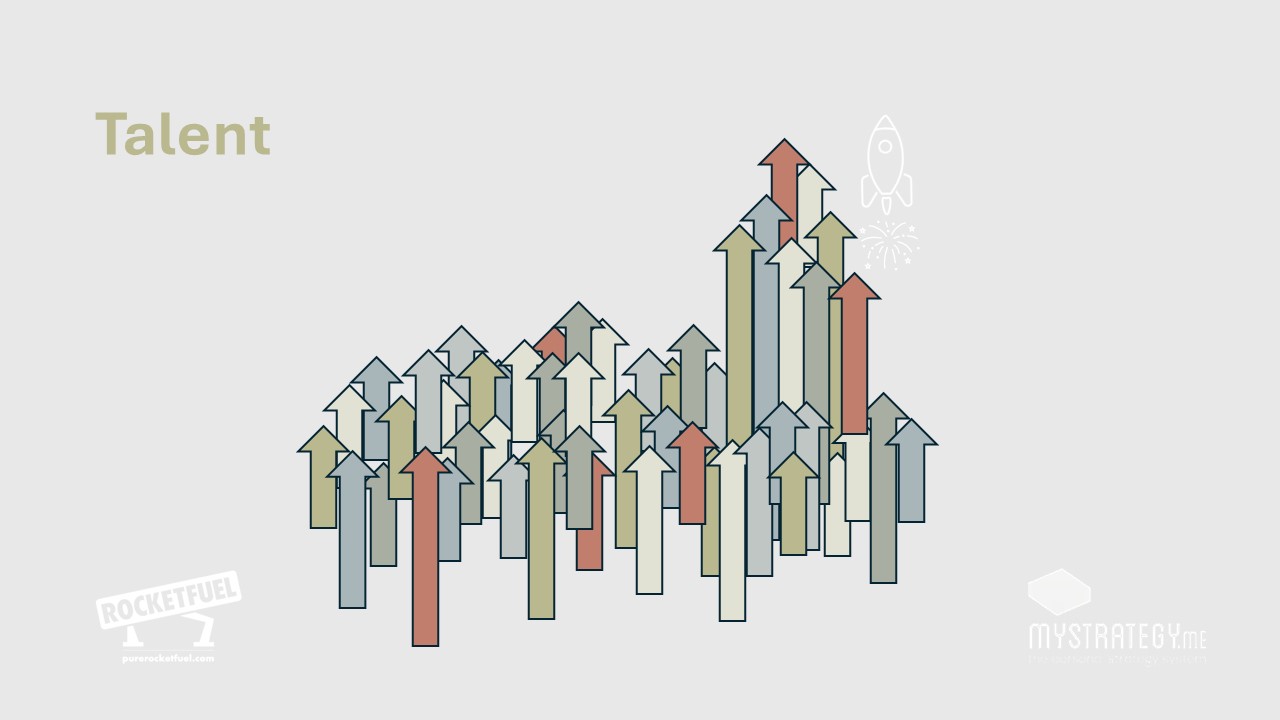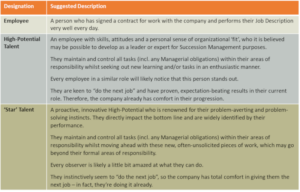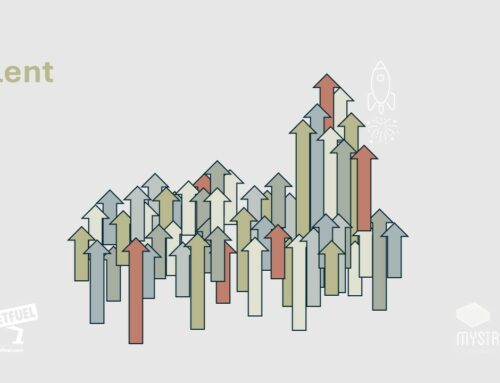
Talent is one of those words that’s all too easy to throw about, so let’s stop doing that, suggests Leadership & Performance Coach, Davina Greene.
What is Talent Management?
Talent Management is a war-zone, if it’s done badly. That’s my necessary opening statement for you.
But it doesn’t need to be done badly, or forgotten altogether. It’s not rocket science, not at all. Any group of managers worth their salt should be able to sit together and define what basic expectations are for each role level in a business, and what constitutes an elevated effort or performance level that might be worthy of the “T” word.
“Talent”, and the concept of Talent Management, covers all steps relating to an organization’s proactive progression of select, high-performing employees, including:
- Attracting
- Acquiring
- Engaging
- Developing
- Aligning
- Rewarding
At the highest level:
The CIPD – the UK-based association for HR or ‘People’ professionals – defines Talent Management as “Maximizing potential through talent identification, engagement and planning”.
The mission of a Talent-related department, if I cling to the old Jim Collins wording, might be something along the lines of “to ensure that the right people are on the organizational bus, and that those people are sitting in the right seat at the right time”.
The Vision of that same department might be “to build a high-performance workplace and a meaningful learning-ground for employees who are in the business “on purpose””.
A company should not use the word “Talent” to describe its entire workforce, just as a company should not use the word “Leader” to describe every manager. “Talent” is a word reserved for particular, impressive, aligned organizational citizens.
What is Talent?
Outside of the world of business, talent is defined as “natural aptitude or skill”. Keep this in mind, it is vitally important, that word “natural” – when something comes naturally, it’s done instinctively, efficiently, with a smile. And isn’t that what we’re aiming for here?
I’m always very quick in these circumstances to underline that the person who attended the most courses, made the most effort, crafted themselves into the best version of themselves is wonderful…but never as wonderful, or reliable, or leader-y, as the person who never had to ask, who just seemed to flourish in their environment without having to bend and flex their skills or behaviors too dramatically. People notice those. And people follow them.
Where people seem to be forcing themselves into a particular mold, I mainly sit around waiting for the ‘house of cards’ to collapse, which it usually eventually does.
Expectations of Talent within an organization should be clear so that people are empowered to meet the necessary criteria, with consistency of application across everyone in the business. Any deviation spotted in any area of the business can diminish the success of your talent philosophy and bring about unneeded, time-stealing disputes due to perceived unclarity and/or unfairness.
Talent: Employee Level
The optimal employee will be genuinely interested in the role they have chosen for themselves, and is therefore genuinely engaged. They are largely self-motivated. They know what they want and are deliberately on a path, rather than relying solely on guidance from others. Phrases such as “Help me”, “Tell me what to do”, “What type of training do I need?”, or “What should I do with my career?” are only ever asked with reason, forethought and purpose, if at all. The company is fulfilling a particular purpose in their life, and they know what it is and happily engage with that.
They know themselves and continue to proactively learn about themselves. They understand, and work well with, different types of people.
They have business acumen, with a firm sense of maturity and perspective. Their own ‘suitability’ is far more important to them than mere ‘eligibility’, in the context of both business and personal success, and personal wellness. Just because they can do something does not mean they’ll desperately cling to that thing, and make demands in relation to that thing, unless they have concluded that that thing is indeed of genuine interest to them as a career path.
They apply learning and coaching, with clearly visible results. They know that “doing the course” is only the beginning of the story.
They do not repeat any error, once coaching on that error has been received – learn, absorb, perform; learn, absorb, perform…
The optimal employee respects experience and practice. They do not think that doing something once means that that task has been mastered. They understand that adding layers of quality and richness to the performance of a role is a skill that comes with time.
The optimal employee understands the nature of the business. They have observed and understood the nature of the business, the size of the business, the activity of the business, and the intent of the business – where any of those things are unclear, they have asked. They know whether the company’s primary offering to employees is learning, brand/prestige, salary, or something else, and work contentedly within that environment.
Talent: Manager Level
The optimal manager works hard to master the core skills of Management alongside concerning themselves with developing Leadership skill. After all, they cannot properly lead if they cannot actively understand, demonstrate, and coach on ‘best practice’ on a day-to-day basis.
They understand that different skills can be learned at different client accounts/departments/companies of different industries and sizes, and are willing to move around in order to have those experiences. That said, they understand that core Management and Leadership skills are universal and transferrable.
The optimal manager makes decisions that are best for the business; not decisions that are best for themselves or their friends.
They do not try to skip steps/skills in reaching the next level. They want to be a robust, credible manager who leads by example.
They are action-oriented. They would never sit and complain for long periods; rather, they gather a team and solve the problem.
They realize that they are responsible for all aspects of their team – they use Support functions in an advisory capacity only, once they get their head around the ground rules. They understand that they are required to become a One-Stop-Shop of general management skills, rather than a specialist in preferred areas.
Talent: Leadership Status
The title “Leader” is earned. Receiving a promotion does not mean you are a Leader. Managing a team does not mean you are a Leader.
To achieve leadership, someone must be following you – whether you have the interest, ideas and influence to bring people down a particular path with you will be clear for all to see. This will determine if you are truly a Leader.
To monitor someone’s progress in respect of leadership, check them against my Leadership Coaching model, below.

Leadership Coaching Model
At all levels, humility and openness to further growth and improvement should be expected. And experience should be valued.
A Healthy Talent Philosophy
Although it can be difficult, a good intent is an approach of “You do the job, and then you get the job”. No surprises for the applicant, obtaining a role for which they had no rehearsal. No surprises for the company, as they have technically already seen the applicant do aspects of the role, and so already are pretty sure they will cope and be credible.
That is, the approach to Talent is optimized when we are confident that employees are already stepping up, have already tried their hand at aspects of any new role, before being given that role. Any ‘onboarding’ into a new management role should really serve as a ‘helpful summary reminder’ of things a person was already aware of, rather than a first-time training session.
All efforts should be made by Managers – in line with business needs – to open doors for Talent to try out new tasks and test the water for alternative/higher roles. It is then up to those people to decide if they want to try things out, or if throwing a few extra hours at developing their career is too much to ask. This tells you about the spirit of your proposed “Talent”, which is useful information in itself.
Defining Talent
Every company should know what it means when the word Talent is used, and have strict boundaries to how the word is applied. For example:

Possible Talent Type Definitions
Any of the above 3 employee types can come from any level of an organization, from entry level roles to Director.
High Potentials will be relatively low in number. Stars will likely be extremely low in number. I find that it can be very, very important to spell this out clearly from the get-go. In this era of handing out endless awards to adults in the workplace, for various reasons from the commendable to the totally pointless (I’m not a fan of excessive awarding as an engagement tool, in case you hadn’t guessed!), it is vitally important that promotions and “Talent” designations are not viewed in the same light. As I always say in my individual and group coaching sessions, when matters of promotion arise, “A promotion is not a Thank You; it’s a person volunteering themselves into a whole new level of serious responsibility”.
(As a slight aside, a CEO I worked with used to give the same speech regularly about the 1-5 scales used for Annual Reviews and, even as the company was rapidly growing, made abundantly clear that there were only 3-4 people he knew of in the organization who would be scoring a 4 or a 5. “3 is defined as Average, and by the very definition of the word ‘average’, it means we’re doing well to be able to say that a vast majority of our workforce is operating at a 3“. It was the best, most logical, most clarifying and time-saving routine speech I ever encountered in my working life!)
“Busy-ness” is not an indicator of stardom. Many are busy a lot of the time, for a variety of reasons, not all of which are increasing our skills.
And it goes without saying that a person who drops certain responsibilities in order to move onto more ‘interesting’ tasks will count as neither High-Potential Talent nor Star.
In short: There is a lot to observe, a lot to get clear about through internal discussion, and a strict adherence to the agreed framework is necessary at all times.
The Talent Identification Commitment
A company’s Talent identification and measurement should be evidence-based. For example, interviews should be built on applicant stories, so their own ability to tell their own real-world story will play a significant role in their progress. If story-telling is a key part of leadership, then this is an early way of understanding if they see the bigger organizational picture, the bigger story…and their own personal story within that.
“I have done that multiple times” should always win over “I could do that”.
Natural, instinctive, non-instructed talent in relation to Skills and Behaviors should be recognized and valued above all else. Learned talent, with visible effort applied and resulting change achieved, will come a close second.
There should be an open-door communication policy that facilitates employees in raising with their Manager, at any time, any skills they possess and would like to use in the organization.
A company should does its best to put internally-grown and externally-hired Management and Leadership expertise in front of staff, to provide a strong and varied example of both disciplines. I’m a big fan of varied Management experience, over and above a long-term, entirely self-taught management “family”.
Nobody should be expected to be perfect at everything. An organization should respect different types of skill and do its best to facilitate good people in progressing down the right path. For example, acknowledge the value of both Generalists and Specialists, and endeavor to test all employees with a variety of tasks to help them determine which they are. “Managing people” is not the only way to achieve success in an organization. Or, to say that everyone in your Management needs to be, for example, a “control freak” is just plain stupid. You need a mix of skills, a mix of behaviors, that’s just common sense – that is, the best combination of abilities available to sit at a particular table to solve a particular problem.
“How we do things here” should always be open to discussion, where an experienced individual believes they know a better way, or where a creative, innovative thinker has an alternative to suggest. So many companies neglect to find out, and learn from, the skills of externally-hired managers, instead trying to correct those managers’ behaviors to make them match those of the internally-bred clan. Talk about wasted opportunities!
Any organization should allow – indeed, expect – Managers to set aside time for proactive strategizing, rather than reactivity only. This time should include matters relating to Talent and Succession.
Stars should know they are considered to be Stars, and be held up as examples to others . If you are a Star in the business, the CEO (or, depending on the organization’s size and scale, a very senior leader) should know your name, as a sign that your storytelling around continued success, and staffing for it, is alive and well.
The Talent Ground Rules
Any organization should want “the right people in the right seat on the right bus”, to be proud of their workforce, and for any other employers to be highly impressed with the caliber of staff that organization puts out into the world.
Therefore:
- Length of service should not be used as an indicator of “fit” or “talent”.
- No situation should be tolerated where someone feels like they are being taken for granted, or ‘politically bypassed’ without explanation. In this regard, an organization should standardize how people are measured, through fact and evidence, to facilitate Talent-related conversations across the business.
- The application of knowledge by an individual is critical in defining their status in the organization. The mere claiming or gathering of knowledge by an individual is of minimal interest to the business.
So, are you ‘talent’? After reading all of that, what do you think?
Which of the above criteria do you meet, where do you excel? Why not begin to build your story by grabbing pen and paper and building the outline now – past successes, and areas for improvement?
Leaders are required to have a strategy and tell a story, if leadership is your aim. What story are you telling? Start by letting the relevant people, the deciders, know your strategy for you!
Interested in investing in your own personal – and personal strategy – development? Check out www.MyStrategy.me!
Share This!
About the Author



